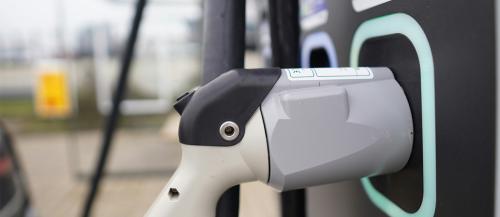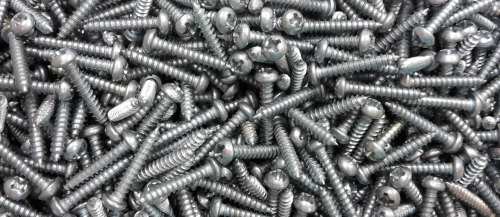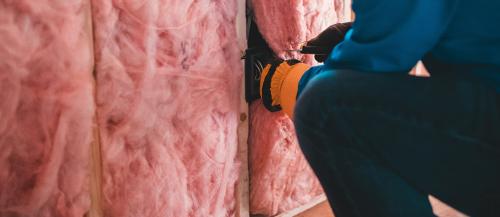At BS Fixings, we understand the importance of secure and reliable fastening solutions, and chemical resin anchors are a prime example of our high-quality fixing products. Used as a durable method to affix heavy-duty fixtures to concrete and masonry, these anchors work by injecting a resin into a pre-drilled hole and then inserting a fixing stud. When inserted, the stud bonds with the resin to create an incredibly strong anchoring point.
Understanding Chemical Resin Anchors
Chemical resin anchors are the ideal choice when securing heavy objects to tough materials such as concrete or stone. Resin anchors are used in conjunction with studs or anchors, creating a bond that becomes the anchoring point. When fixing into hard materials such as concrete and masonry, traditional mechanical bolts may cause splitting or cracking, which leads to a less secure structure. Chemical resin anchors do not use the process of expansion, instead, the load is spread across the entire anchor, creating a fixing with minimal stress points. This creates a much stronger and more reliable fixing. Due to their security, chemical anchor systems also offer the possibility to be used in dry, wet, and flooded holes without the loss of performance.
The Advantages of Chemical Resin Anchors
Chemical resin anchors are favoured for their versatility and strength, providing several key benefits:
- Airtight and Waterproof: once installed, resin anchors form an airtight and waterproof seal, filling any irregularities or gaps within the substrate.
- High Load Capacity: as the load is spread across the length of the anchor, it can support heavy loads. The resin can also be applied at various depths to increase load capacity, making it a versatile choice.
- Flexibility: whilst they are a heavy-duty type of fixing, they are suitable for use in a range of substrates, including cracked and non-cracked concrete, as well as masonry.
- Adjustability: as the resin is not set straight away, the anchors can be adjusted during installation, which is not possible with mechanical types.
- Durability: chemical anchors are resistant to extreme temperatures, chemicals (acids, oils, solvents, and alcohols), and corrosive environments, making them perfect for a variety of projects.
Types of Chemical Resin Anchors
Resin anchors are available in a variety of materials to suit different environments. Here at BS Fixings, we stock two injection resin types:
JCP Polyester (Styrene Free) Resin
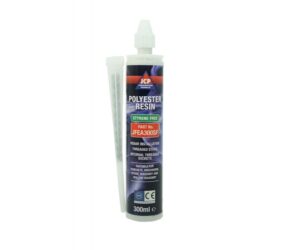
This polyester styrene-free resin is the perfect choice for general-purpose tasks, being able to secure anchoring bolts, threaded rods, and other fixings into solid substrates. It is a cost-effective and easy-to-use product, supplied in a user-friendly mastic gun that can be used by beginners and professionals alike. It is suitable for use in both dry and damp conditions and provides excellent resistance to chemicals and other corrosive agents.
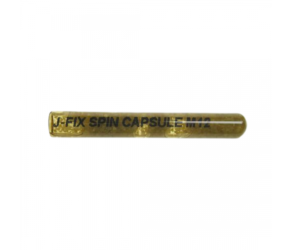
These glass capsules contain epoxy acrylate and quartz aggregate, to create a high-performing and anti-slip bond. The resin offers incredible strength and chemical resistance, making it ideal for demanding construction projects. Similar to the polyester resin product, these glass capsules are simple to use. To use these capsules, all you need to do is insert them into a pre-drilled hole and spin the threaded stud or rod into place. As the fixing is tightened, the glass capsule breaks and releases the resin mixture inside to create a strong bond.
Installation Process
The installation process of resin anchors is relatively straightforward (as mentioned briefly above), but you still must be careful to ensure maximum performance:
- Drill the Hole: to install a fixing into concrete or masonry, you need to drill a pilot hole. We recommend using an SDS drill bit to create a hole that is the correct depth.
- Clean the Hole: once you have drilled a hole in your desired location, you should thoroughly clean the hole and surrounding area to remove dust and debris to ensure the resin bond is as strong as possible. To do this, you can simply use a brush to wipe away the excess or use an air blow pump.
- Inject the Resin: after cleaning, you can inject the resin. Depending on the type of product you choose, you might need a special application gun. Slowly fill the hole until the resin reaches the bottom.
- Insert the Fixing: place your chemical anchor bolt or stud into the resin-filled hole and push and rotate it into position.
- Let the Resin Cure: depending on the resin you have chosen; you will need to let it cure for the recommended time. Once hardened, your fixing will be securely in place!
At BS Fixings, we provide a comprehensive selection of chemical resin anchor products, all of which are ETA-approved. We stock a wide range of studs, including stainless steel, galvanised steel, zinc plated and ZYP, to ensure you find the right stud type for your project. Our team is always ready to assist you in selecting the right product for your specific needs.
Safety Considerations
Whilst chemical resin anchors offer numerous benefits, it’s important to note that their installation requires careful attention to detail. Small mistakes, like incorrect angles or poorly cleaned drill holes, can reduce the anchor’s load-bearing capacity.
Moreover, the chemical components of these anchors can cause skin irritation and may cause an allergic reaction. Therefore, it’s important to use suitable protective clothing during installation such as gloves.
Chemical Resin Anchors vs Mechanical Anchors
Whilst chemical resin anchors and mechanical anchors are used for similar purposes, they work on completely different tension and reinforcement principles. One of the main advantages of chemical anchors is that they don't transfer pressure into the substrate, making them more suitable than mechanical anchors for use close to edges or in weak or cracked concrete.
On the other hand, mechanical anchors tend to be more economical and require a smaller clearance hole for push-through installation. However, they have limitations in their expansion behaviour when being positioned, which can lead to cracking of the surrounding concrete.
The choice between chemical and mechanical anchors largely depends on the specific requirements of your project. Please feel free to browse our extensive fixing and fastening range on our website today or if you have any questions, contact us on 03330 117818 or email info@bsfixings.co.uk and we will be more than happy to help!



